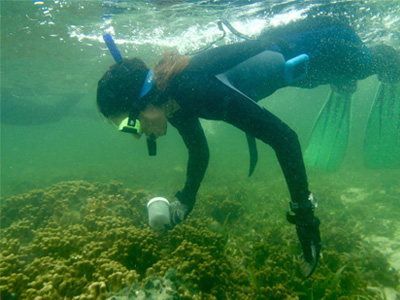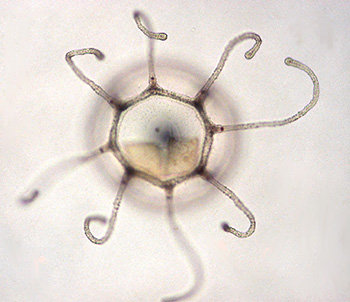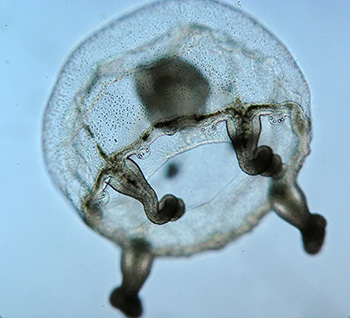Jellyfish Day
TweetToday, November 3 is Jellyfish Day and it is a reminder that jellyfish can be a real problem in Texas coastal waters and tributaries. Dr. Maria Pia Miglietta is an assistant professor and head of the Miglietta Lab at Texas A&M University at Galveston. Her research focuses on the evolution, genetics, and ecology of Cnidaria.
 "As an undergraduate I worked on feeding behavior of medusa, also known as jellyfish, and their benthic, or bottom dwelling counterpart, the polyps said Dr. Miglietta. "Jellyfish have been around for at least 500 million years, and are very successful. The incredible variety of forms, shapes, and life cycles fascinated me since the very beginning."
"As an undergraduate I worked on feeding behavior of medusa, also known as jellyfish, and their benthic, or bottom dwelling counterpart, the polyps said Dr. Miglietta. "Jellyfish have been around for at least 500 million years, and are very successful. The incredible variety of forms, shapes, and life cycles fascinated me since the very beginning."
Jellyfish have a variety of life cycles strategies. In Dr. Miglietta's laboratory she studies the species Turritopsis dohrnii, also known as the immortal jellyfish. "When faced with unfavorable conditions such as lack of food, change in salinity or physical damage, the immortal jellyfish forms a cyst and reverts back to its juvenile stage, the polyp, thus escaping death." said Dr. Miglietta. "This is one of the most interesting life cycle strategies I have encountered, and understanding how this species can revert its development represents a major research interest of my laboratory."

Jellyfish are produced by polyps through a process called strobilation, a form of asexual reproduction where segments of the body break off and develop into a new individual. Cues from the environment triggers the polyps to begin this process, producing massive amounts of jellyfish which are visible in blooms. Blooms can be BIG, numbering in millions of individuals.). To this day, scientists do not completely understand the cues that trigger this mass medusa production.
Jellyfish are a life cycle stage of the phylum Cnidaria. Sea-anemones and corals also belong to this phylum. Unlike other species who have more complex organ systems, jellyfish have a very simple body plan consisting of stinging cells called nematocyst, a single opening used to both ingest prey and excrete undigested waste, two layers of cells and jelly-like material called mesoglea in its center. Jellyfish tentacles are packed with stinging cells, which explode when touched. The stinging cells, or nematocysts, have spines that can penetrate the skin and inject venomous toxins. "They are top predators, says Dr. Miglietta. "They kill a variety prey such as small larvae or any small animals using their tentacles."
Some of the most venomous creatures in existence belong to Cubozoa, or box jellyfish. They are small and unassuming, but can be lethal. There are about 20 species of box jellyfish around the world, mostly in the Pacific Ocean. Their venom attacks nerves, the heart, and destroys the skin and their sting can be fatal.
Dr. Miglietta says the best treatment depends on the species of jellyfish. "Generally speaking, it is good to wash with saltwater and apply a paste made with a 1:1 ratio of baking soda and saltwater and remove all residual tentacles. Do not apply freshwater, pressure or alcohol as they will trigger more nematocyst discharge. Go to the doctor if pain persists."
 Jellyfish are often seen as a nuisance by swimmers and beachgoers. However, they are important members of the marine ecosystem, they have interesting life cycles and unique regenerative capabilities, and have been around for a long time. By studying them we may understand notions on evolution, senescence, regeneration and development.
Jellyfish are often seen as a nuisance by swimmers and beachgoers. However, they are important members of the marine ecosystem, they have interesting life cycles and unique regenerative capabilities, and have been around for a long time. By studying them we may understand notions on evolution, senescence, regeneration and development.
You can learn more about Dr. Miglietta and her research on jellyfish blooms and the immortal jellyfish by visiting https://www.tamug.edu/miglietta/. You can also support her lab with donations online by visiting https://give.am/SupportTAMUG and writing "Miglietta laboratory" in the "Additional Comments or Instructions" box toward the bottom of that page, or by sending a check made payable to "Texas A&M University at Galveston" and including the same comment to the following address:
Texas A&M University at Galveston
Development Office
P. O. Box 1675
Galveston, TX 77553-1675
###